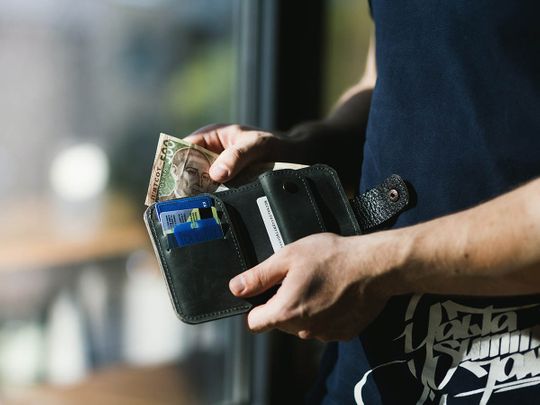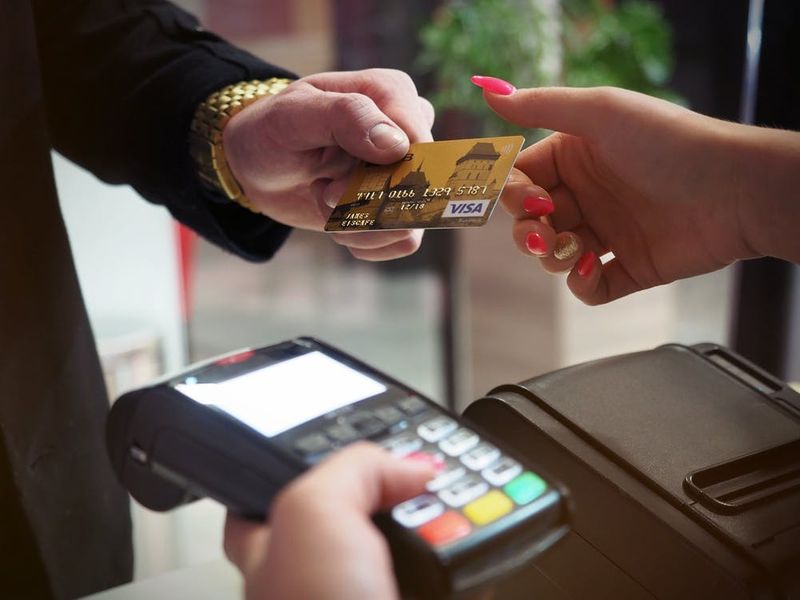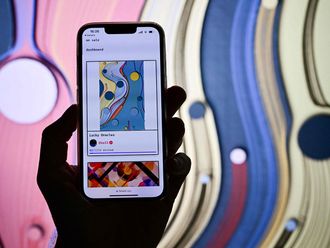
Residents in the UAE prefer to use a mix of cash and cards for their daily transactions, with a higher propensity to use credit cards that earn them rewards in return for their outgoing expenditure.
According to a 2019 survey by Visa and the Department of Economic Development in Dubai, UAE consumers are increasingly comfortable paying with cards, with 84 per cent of respondents finding cards more secure than cash.
84 %
Of users find cards more secure than cash
However, financial advisors observe that there is no optimal way to use a mix of cash, debit and credit cards to manage your monthly expenditure. It ultimately depends on what mode of payment users are comfortable dealing with and how they want to spend money. Perhaps it is a mix of different methods that work for you.
While some UAE residents only use credit cards in an emergency, others use cards alone for all their monthly outgoings and settle the amount at the end of every month. But the trick with credit cards is to use it as a financial tool and ensure that the balance is settled every month or you may end up paying a lot in fees and interest charges.
Where credit cards are used
Some UAE residents use a single credit card for all their purchases in a month and then pay it back in full to take advantage of points for airline miles. Certain credit cards also offer more advantages in terms of security and protection from identity theft and fraud. You can also refer to your credit card monthly statement as a budgeting tool to keep track of all your expenditures.

Residents use credit cards linked to some kind of reward system that provides air miles, cash back, discounts or points that can be redeemed for goods or experiences. A lot of UAE banks have relationships with restaurants, shops and malls to offer discounts through using their banking facilities. With credit cards, you can take advantage of some benefits that debit cards and cash do not offer. Some also use credit cards exclusively for recurring charges like a subscription or membership programme, for instance.
However, wealth advisors have a caveat for card users. Cards are not free money.
What to watch out for when using a credit card
- If you are using a credit card, be absolutely disciplined
- Don’t be lured by the high credit limits offered by banks
- Repay your credit card balance in full every month
- Set up an automatic transfer to repay your credit card spend in full
“With the introduction of contactless payments through tap and go with smartphones and smart watches, it’s very simple to not realise how much you are spending. A tap for a coffee or food at Dh25 twice a day can quickly add up over the course of a month. Get into the habit of asking for a receipt, put them all in a bowl at home and add them up at the end of the month. It will shock you,” warns David Raynor, financial consultant, deVere Acuma.

With the introduction of contactless payments through tap and go with smartphones and smart watches, it’s very simple to not realise how much you are spending
If you are using a credit card, be absolutely disciplined. Don’t be lured by the high credit limits offered by banks and go on a spending spree beyond your means. Instead, a savvy customer will repay their credit card balance in full every month to avoid paying high interest rates. Experts recommend setting up an automatic transfer to repay your credit card spend in full by the due date. If payments are not made to a credit card, this becomes a serious issue in the UAE and banks take a hard line stance regarding debtors.
Expat speak
Reema Kiran, an Indian expat, has a monthly direct debit facility from her account to pay for her credit card expenses. This helps her to keep a tab on expenses. She admits to using her credit card for discretionary purchases as it helps her accumulate loyalty points. While purchasing big-ticket items with a credit card, her family opts for installments if they are free or the charges are cost-effective.
“Paying for school fees and groceries earns you a lot of points which can be later redeemed for cash back or discount. If managed well, credit cards can be of great use,” she says. Although she uses cash as well for her monthly transactions, Reema observes that it’s easier to carry a card than cash bundle.
Another expat Fernandes uses his credit cards only for necessary expenses and transacts with cash for all other purposes. “For example, if it is small grocery purchases, I use cash, but if it goes above Dh100, then I use my credit card. For school fees, I pay with a credit card. But for other extracurricular classes for my kids, I use cash as the firms only accept currency,” he tells Gulf News.
If it is small grocery purchases, I use cash, but if it goes above Dh100, then I use my credit card
Debit card usage
Debit cards are also used heavily in transactions in the UAE since it is convenient and connected with users’ bank accounts, where the majority of wealth is stored. When you use a debit card, you are effectively making a cash transaction.
“Debit cards make the most sense as there are no fees for using one, no build-up of debt and the added security that if you lose a card, you have just lost a piece of plastic, not actual money,” says Keren Bobker, senior partner, Holborn Assets.
You may not win rewards with a debit card but you don’t have to worry about interest charges or late fees.
Need for cash
While most users can’t avoid dealing in cards for the fear of missing out on great perks and rewards, don’t rule out cash just as yet. Using cash has the same effect as using a debit card, but with currency notes, you tend to spend less than you would by swiping a card since you actually see the money go away from your purse. With cash, people have a better idea of how much they are spending. It is the ultimate budget-friendly option.

“If you don’t have the discipline to stick to a budget or don’t repay spending on a credit card in full each month, then cash may be a better option. A debit card is similar to cash but it can still be seen as not quite real so people can overspend. Sometimes people will think twice about spending if they have to hand over cash,” advises Bobker.
Using cash only over the course of the month is considered to be a sensible approach as you are able to keep a close eye on what you are spending. It’s also smart to carry cash as a back-up option in case you need to make a purchase at a vendor who does not accept cards.
Cash can be used for emergency funds. It’s always recommended that you carry a bit of cash on your person at all times. There are many cases in the history of the banking system where various crisis have led to a shutdown of banks and people’s funds became inaccessible and large amounts of money were lost. In such cases, having a back-up fund in cash can come in handy.
So, the next time you are at a merchant counter (either in-store or online), remember that there is no one right answer for any scenario. No matter what your preferred payment method is, avoid spending money that you don’t have or can’t afford to repay.
Saving and investment
Financial advisors also add that rather than focus on what mode of payment is optimal for their monthly outgoings, users should focus on saving and investment.
Research has shown that many people in the UAE have no savings. In the case of an emergency, they’d have a hard time covering even as little as Dh2,000. A lot of people in the region rely on their end-of-service benefit to fund their later lives. However, in most cases, this is not enough.
10 %
Of each month’s salary must be saved
The simple rule is to save around 10 percent of each month’s salary, even when the salary is low, and this money should be moved to a savings account or safely stored in cash.
“Regardless of the income, make sure you have a contingency fund to help you get through hard times,” observes Tomasz Wisniewski, director of research and education at Axiory Global, a forex brokerage firm in Dubai.
The simple rule is to save around 10 percent of each month’s salary, even when the salary is low, and this money should be moved to a savings account or safely stored in cash.
- With inputs from Deepthi Nair










